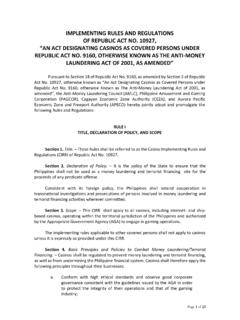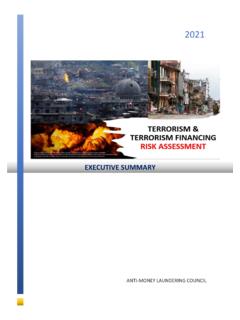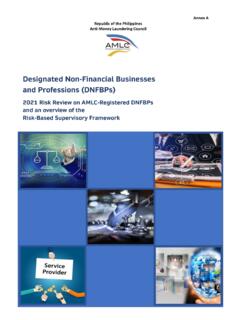Transcription of ANTI-MONEY LAUNDERING COUNCIL
1 ANTI-MONEY LAUNDERING COUNCIL 2018 IMPLEMENTING RULES AND REGULATIONS OF REPUBLIC ACT NO. 9160, OTHERWISE KNOWN AS THE ANTI-MONEY LAUNDERING ACT OF 2001, AS AMENDED In accordance with Section 7(7) of Republic Act No. 9160, otherwise known as the ANTI-MONEY LAUNDERING Act of 2001 , as amended (AMLA), the following rules and regulations are hereby promulgated: Chapter I. General Provisions Rule 1 Purpose, Policies and Principles Rule 2 Definition of Terms Rule 3 unlawful activities Rule 4 Covered Persons Chapter II. Supervision and Enforcement Rule 5 ANTI-MONEY LAUNDERING COUNCIL Rule 6 Powers and Functions of the AMLC Rule 7 Supervision and Compliance Checking Rule 8 Investigation and Law Enforcement Chapter III.
2 Money LAUNDERING , Terrorism Financing, and Asset Forfeiture Rule 9 Money LAUNDERING and Terrorism Financing Rule 10 Freeze Order Rule 11 Bank Inquiry Rule 12 Asset Forfeiture Chapter IV. National Risk Assessment and Management Rule 13 National Risk Assessment Rule 14 National Risk Management Chapter V. Preventive Measures and Obligations of Covered Persons Rule 15 Institutional Risk Assessment and Management Rule 16 Money LAUNDERING /Terrorism Financing Prevention Program Chapter VI. Preventive Measures Rule 17 Prohibited Accounts Rule 18 Customer Due Diligence Section 1. Purpose and Applicability of CDD Purpose of CDD When is CDD Applicable Existing Customers Page 2 of 94 Section 2.
3 Customer Due Diligence Measures Measures for CDD Timing of CDD Average Due Diligence Customer Acceptance Policies Section 3. Customer Identification Process General Requirement for CIP First Time Transactions System for Collection and Recording of Data Required Identification from Natural Persons Required Identification Data from Juridical Persons Required Identification Data from Legal Arrangements Sufficiency of PSN or PhilID in Proving Identity. Section 4. Customer Verification Process General Requirement for CVP CVP for Juridical Persons and Legal Arrangement Timing of CVP Transacting or Using Relationship prior to CVP Modes of CVP Use of Communication and Information Technology Section 5.
4 Identification and Verification of Agents Section 6. Beneficial Ownership Verification General Requirement for BOV Documents Evidencing Relationship Timing of BOV BOV for Juridical Persons BOV for Legal Arrangements Section 7. Determination of the Purpose of Relationship Section 8. Ongoing Monitoring Process General Requirement for OMP EDD After Conduct of OMP Review and Updating of Records Section 9. Risk-based Approach in Conducting CDD Risk-based CDD Risk Profiling of Customers Risk Profiling of Juridical Persons Documentation of Risk Profiling Results Standards for RDD, ADD and EDD Section 10. Enhanced Due Diligence Section 11. Reduced Due Diligence Section 12.
5 Failure to Complete CDD Section 13. CDD and Tipping-off Page 3 of 94 Rule 19 Preventive Measures for Specific Transactions and activities Rule 20 Record-Keeping Rule 21 Reliance on Third Parties and Service Providers Rule 22 Transaction Reporting Chapter VII. Beneficial Ownership Rule 23 Beneficial Ownership of Juridical Persons Rule 24 Beneficial Ownership of Legal Arrangements Chapter VIII. Sanctions Rule 25 Criminal Sanctions Rule 26 Administrative Sanctions Rule 27 Civil Sanctions Chapter IX. Domestic and International Cooperation. Rule 28 Domestic Cooperation Rule 29 Mutual Legal Assistance Rule 30 Extradition Rule 31 Other Forms of International Cooperation Chapter X.
6 Miscellaneous Provisions Rule 32 Asset Management, Feedback Mechanism and Statistics Rule 33 Non-Intervention in the Operations of the Bureau of Internal Revenue Rule 34 Separability and Repealing Clauses Rule 35 Transitory Provisions, Modes of Amendment and Effectivity Clause Page 4 of 94 CHAPTER I GENERAL PROVISIONS RULE 1 PURPOSE, POLICIES AND PRINCIPLES Section 1. Title and Purpose. This set of rules and regulations shall be known as the 2018 Implementing Rules and Regulations (IRR) of the AMLA. This IRR was promulgated to provide the details of implementation of the AMLA, as well as to assist all covered persons, supervising authorities, law enforcement and other government agencies, and other stakeholders by prescribing the rules and regulations to combat money LAUNDERING , terrorism financing being a predicate offense to money LAUNDERING , and other associated unlawful activities .
7 Section 2. State Policies on AML/CTF. The provisions of this IRR are in line with the following State Policies: (a) To protect and preserve the integrity of the Philippine financial system, including the confidentiality of bank accounts. (b) To ensure that the Philippines shall not be used as a money LAUNDERING site for the proceeds of any unlawful activity. (c) To extend cooperation, consistent with Philippines foreign policy, in transnational investigations and prosecutions of persons involved in money LAUNDERING activities wherever committed. (d) To protect life, liberty and property from acts of terrorism and to condemn terrorism and those who support and finance it; and to recognize it as inimical and dangerous to national security and the welfare of the people; and to make the financing of terrorism a crime against the Filipino people, against humanity and against the law of nations.
8 (e) To recognize and to adhere to international commitments to combat the financing of terrorism, specifically to the International Convention for the Suppression of the Financing of Terrorism, as well as other binding terrorism related resolutions of the United Nations Security COUNCIL , pursuant to Chapter 7 of the United Nations Charter. (f) To reinforce the fight against terrorism by preventing and suppressing the commission of said offenses through freezing and forfeiture of property or funds while protecting human rights. Page 5 of 94 Section 3. Governing Principles. The ANTI-MONEY LAUNDERING /counter-terrorism financing (AML/CTF) regime of the Philippines shall be governed by the following principles: (a) The AMLC, as the country s financial intelligence unit, is vested by law with independence to perform its mandate.
9 It upholds the continuous development of a team of highly ethical and professional personnel and implements efficient processes in the delivery of its mandate. (b) The AML/CTF laws, rules and regulations and other relevant issuances are implemented using a risk-based approach in a way that responds to the need to bring the financially excluded into the regulated financial sector, while at the same time maintaining effective safeguards and effective controls against money LAUNDERING /terrorism financing risks. (c) A strong compliance culture, good governance and observance of high ethical standards in the conduct of business are good foundations for an effective AML/CTF regime.
10 It will be developed and sustained through capacity building and deterrence of violations through imposition of appropriate, proportionate and dissuasive sanctions. (d) A sound risk management system to identify, assess, mitigate, monitor, and control risks associated with money LAUNDERING /terrorism financing is essential. (e) Timely and effective domestic and international cooperation and established coordination mechanism are critical in the investigation and prosecution of money LAUNDERING /terrorism financing and associated unlawful activities . (f) The implementation of AML laws, rules and regulations shall conform to international AML/CTF standards and best practices.









